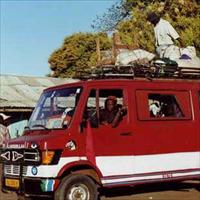AFRICA: Welcome mat worn thin in SA

Recent attacks on Somali, Zimbabwean and Mozambican migrants in South Africa have been labeled xenophobic: but could the violence point to a much bigger problem than fear of the foreign, a problem much closer to home?
Less than a month ago, three men died in mob attacks aimed at foreigners throughout the Brazzaville, Saulsville, Phomolong and Vergenoeg informal settlements west of South Africa's capital, Pretoria. As their shops and homes were looted and burned, many foreign nationals sought refuge at the nearby Atteridgeville police station; some were taken to Lindela repatriation centre for deportation, while about 560 ended up housed in a local school, according to Home Affairs spokesperson, Mantshela Tau.
With school resuming after the Easter holidays, a remaining group of about 150 - including 22 children - have now been moved to a large vacant storefront in Pretoria that remains under tight security. Meanwhile, no timetable has been set to implement the decision by Home Affairs Minister Nosiviwe Mapisa-Nqakula and Pretoria's mayor, Gwen Ramokgopa, to resettle them in their former communities – supposedly hand-in-hand with a series of community meetings to help ease tensions, Tau said.
Attacks on foreigners in South Africa are far from new. But according to Jack Redden, the United Nations High Commission for Refugees (UNHCR) regional spokesperson, there has been an alarming increase in recent months; and no one is quite sure why.
"We've heard about six different incidents since the end of January," Redden said. "They're getting increasingly nasty and increasingly violent."
Unhealthy competition
UNHCR has been working with the government in a long-standing campaign to “roll back xenophobia”; it doesn’t seem to have made much of an impression on Tshepo Serala. At noon on a Tuesday, he was sitting in the sun with friends in front of a small shop in the Brazzaville informal settlement where he lives, and offered his opinion on the violence.
"They take our jobs," was his justification. “As South Africans our education is low and those people, they know business and some are educated."
"I can say it's better without them," said Sipho Seheri, from the neighboring settlement of Jessville. "They were doing some serious crime ...But I can show you foreigners who are working straight [who are not involved in crime] and they are still staying here. It's just that most of them are doing crime."
An unemployment rate estimated at around 40 percent, bitterness over the snail’s pace of service delivery, criminal violence organised by local business rivals to shut down foreign-owned stores, a perverse chauvinism inculcated by apartheid – it has all been used to explain the anger meted out to foreigners, and the fear among some South Africans they are on the losing end in a competition for too few resources.
For generations migrant workers from across the region have been drawn to South Africa. At the end of minority rule in 1994, the numbers of immigrants accelerated; along with the sentiment that foreigners were somehow taking advantage of the system, even though the economic benefits of migration in terms of skills sharing, job-creation and trade is championed by the government.
Dr Asa August Ngwezi, a clinical psychologist who runs a local NGO in Atteridgeville, and who provided counselling to victims of the attacks, said the violence was a mix of desperation and ignorance, especially among young South Africans.
"I work everyday with people that are desperate from hunger and unemployment, young people. People have lost faith in the leadership at the top, the police and local government," he said. "You move into a foreigner's shop, it is well stocked with food, you are hungry, you have no money, what happens? Mob psychology."
"[These attacks] was not done by elderly people, this was done by young people," Ngwezi commented. "Our freedom couldn't have happened without the Mugabes, the Machels, and the Kaundas. Their efforts led to our emancipation, but in South Africa – and I'm not afraid to say this - most young people are not politically up to scratch."
Representatives from South Africa's Human Rights Commission (SAHRC), a statutory body charged with monitoring human rights, visited Atteridgeville soon after the violence, and recommended that South Africa ratify the International Convention on the Protection of the Rights of All Migrant Workers and Members of their Families.
Ratifying the convention would level the playing field in terms of jobs and resources, explained SAHRC media manager, Vincent Moaga.
"Right now there are foreign nationals working on farms in Limpopo [in the north] for poor pay and in bad conditions," he said. "With no legal framework to provide for their protection they will work for anything."
By extending legal protection to non-citizens and forcing employers to pay foreign and local hires alike, foreign labourers would cease to undercut local workers. “The local populations would feel less resentful because they would all be treated the same," Moaga argued.
 Back and Next - Back and Next
Back and Next - Back and Next See Also - See Also
See Also - See Also